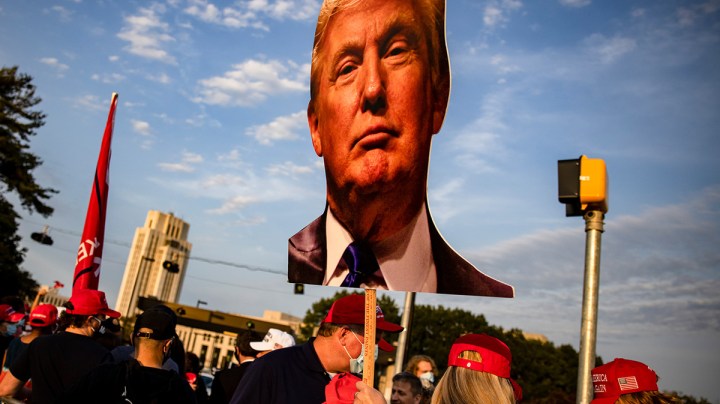Here’s What May Happen if Trump Can’t Govern Due to COVID-19 Condition

Supporters of President Donald Trump gather outside of Walter Reed National Military Medical Center after the President was admitted for treatment of COVID-19 on October 4, 2020 in Bethesda, Maryland. Photo by Samuel Corum/Getty Images
Yesterday (Oct. 3), President Trump boasted in a video shared on Twitter that he now “gets” and “understands” COVID-19. Since testing positive, along with FLOTUS and other members of his administration, he’s “learned a lot” about the virus.
“It’s been a very interesting journey,” he notes.
And it’s not over: We know already that COVID-19 is a capricious illness. Symptoms range and symptoms change. Many survive the virus, while more than 200,000 Americans have not.
Regardless of the quality of care he receives or the state of his health before contracting the virus, there is no telling how Trump will fare health-wise.
Anything could happen. And that includes the possibility that, at some point in this “journey,” Trump may not be able “to discharge the powers and duties of his office.” The latter quote is pulled directly from Section 3 of the 25th Amendment, the Constitution’s guide to managing “Presidential Disability and Succession.”
As pointed out by this Bloomberg opinion piece, there are two routes “by which transfer of power can occur.”
One is voluntary: the President provides a written declaration stating his inability to govern and subsequently the Vice President—in this case, that’s conservative Republican Mike Pence— becomes Acting President.
The other, however, shifts the decision-making power elsewhere.
Section 4 outlines how the Vice President and a majority of the executive administration can decide, together, that the President is unable to govern. This is not necessarily permanent, as the President can “produce a written declaration that he is well and become president again.”
Written by a columnist who, as a lawyer in the Reagan administration, was assigned the role of resident expert on the 25th amendment, then nearly had to implement its guidelines when Reagan was shot, the Bloomberg piece succinctly outlines what could or could not happen.
What may or may not unfold, though, is still a mystery. For the past nine or so hours, Trump’s been tweeting up a pro-voting storm on his personal account, all of these tweets pushing his campaign positions (pro-life, religious liberty, law and order, and a strong military).
That could mean he’s feeling well—or that he wants the world to think he is, at least.